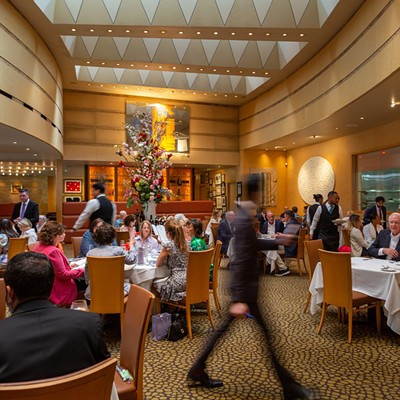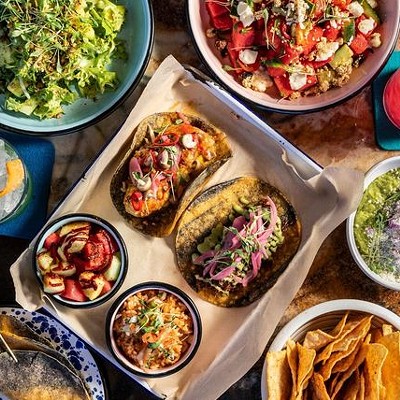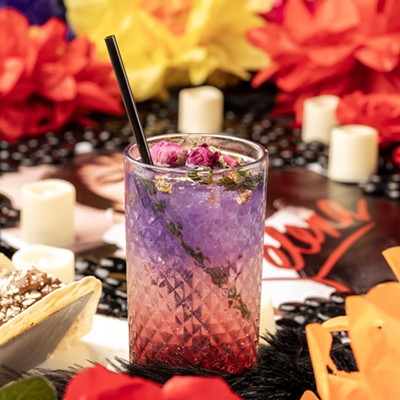Support Us
Houston's independent source of
local news and culture
account
- Welcome,
Insider - Login
- My Account
- My Newsletters
- Contribute
- Contact Us
- Sign out
Chef Chat, Part 1: David Guerrero of Andes Café — South America in Houston
Phaedra Cook June 3, 2015 8:05AM
[
{
"name": "Related Stories / Support Us Combo",
"component": "11591218",
"insertPoint": "4",
"requiredCountToDisplay": "4"
},{
"name": "Air - Billboard - Inline Content",
"component": "11591214",
"insertPoint": "2/3",
"requiredCountToDisplay": "7"
},{
"name": "R1 - Beta - Mobile Only",
"component": "12287027",
"insertPoint": "8",
"requiredCountToDisplay": "8"
},{
"name": "Air - MediumRectangle - Inline Content - Mobile Display Size 2",
"component": "11591215",
"insertPoint": "12",
"requiredCountToDisplay": "12"
},{
"name": "Air - MediumRectangle - Inline Content - Mobile Display Size 2",
"component": "11591215",
"insertPoint": "4th",
"startingPoint": "16",
"requiredCountToDisplay": "12"
}
,{
"name": "RevContent - In Article",
"component": "12527128",
"insertPoint": "3/5",
"requiredCountToDisplay": "5"
}
]
Houston is known as a multicultural city — a true melting pot of people and cuisines from around the world. This continues a series where we take a look at the chefs responsible for creating authentic dishes from several different nations right here in Houston.
Some chefs focus on a country. At Andes Café, chef David Guerrero is taking on a whole continent. Specifically, he serves cuisine from the countries that the Andes mountain range traverses. That includes his birthplace of Ecuador as well as Peru, Argentina, Venezuela, Colombia, Bolivia and Chile.
Chefs of independent restaurants put up with a whole lot in their lives. There are long hours. Sometimes it’s a bad month but those employee paychecks, food bills, rent and utility costs still have to be covered. Guerrero has had to deal with even more than a typical chef.
Our last Chef Chat with him was in November 2011. At the time, he was still chef at Samba Grille. A whole lot has happened since then, much of it bad, and yet if Guerrero has proven one thing, it’s that he’s a survivor, in both the personal and the professional sense.
Guerrero just got out of the hospital a few weeks ago, after having brain surgery under the care of Dr Nitin Tendon to remove tumors. (Visit this link for an in-depth article we wrote just before he went into the hospital.) It’s not the first time he’s had to have this done, but unlike the first time around, this time he’s made a remarkable recovery. He’s already back to work (and, obviously, giving interviews). He says he gets tired easily and is usually wiped out by 3 p.m., but he’s struggling through.
“I was lucky this time,” he says. “It was Stage 2. A Stage 3 would have needed more aggressive treatment.”
Even so, his treatment isn’t over. Guerrero still has to undergo chemotherapy, which he starts on June 16. That means more medical bills will stack up on top of the ones from his recent surgery. The chemotherapy is to help prevent future tumors. As Guerrero ages, recurrences will become harder to recover from, and every surgery carries great risk.
“A lady I met named Rosa said she’d been through chemotherapy and radiation at MD Anderson and has been tumor-free for 15 years. That’s big,” he says. So, unlike with his first surgery, where he opted for observation alone, he’s taking chemotherapy in the hopes of having the same optimistic outcome.
His fellow industry professionals are putting on a fun fundraising event on Monday, June 15 from 6 to 10 p.m. The public is invited to Batanga at 908 Congress downtown for the 86 Cancer Chef Challenge. Competing chefs include Houston’s youngest executive chef, Omar Pereny of Peska World Seafood, Alex Padilla of Original Ninfa’s On Navigation, Erin Smith of Main Kitchen, Batanga’s own chef Rishi Singh with the home turf advantage, and many, many more. Each will have an opportunity to present two dishes for judging, and attendees receive 12 tasting tickets to check out the chefs’ creations for themselves. Tickets and more information are available at this link.
That is the present. Here is Guerrero’s journey from 2011 up to this point.
Samba Grille closed in July 2012. Guerrero had an acclaimed run there as the executive chef who replaced the first one, Cesar Rodriguez. Guerrero’s adventurous ceviches made guests and reviewers alike sit up and take notice, but it wasn’t enough to save the restaurant. Samba Grille was challenged by an audience who didn’t want to stay downtown at night or deal with expensive valet parking, among other things. When there were theater performances in nearby Verizon Wireless, Wortham Theater and Jones Hall, Samba was busy. Otherwise, it was not.
Samba Grille's closing left Guerrero hunting for a place of his own with a sponsor at his side. “I was 23 years old and I had always wanted a restaurant. I used to sell food outside of clubs from 12 o’clock in the morning to 3 p.m. at ten different clubs. I have a DBA for a business called Arepa Chef, and it was French-Latin fusion. I used to do coq au vin, rabbit, lamb and put it inside of an arepa with cheese. It was really good.
"When we closed Samba Grille, this guy approached me and said, ‘We have two locations available — one on Eldridge Parkway and one on Montrose.’ I went to the Montrose one and it was a beautiful place. 2011 was when my name was coming out and he saw that. He saw I knew a lot of people and thought that would draw them in. That was a mistake.
"The Eldridge location of Alma Cebiche & Bar came first. Unfortunately, there never was a follow-up in the Montrose.
"We closed Samba Grille on a Friday. We jumped in with 70 people Friday, Saturday and Sunday and opened on Tuesday. There was no time to set expectations, and that was something else I learned. These days, for six months people are expecting a new restaurant to come in, so they’re anticipating.”
Guerrero also found the Energy Corridor market to be a tough, conservative market. “Basically it’s all lunch, and my food was too advanced. At night, it was different. There were a lot of European people, especially from England. They love Peruvian food. We had a couple of people from Venezuela try our food, but it wasn’t enough.
"My investor came from a place that sold burgers and wraps — stuff like that. He thought we’d start making money in a month, two months. My place wasn’t like that. It was a place to relax, come eat and try something different.”
A mere five months later, Alma closed. At first, his investor stated an intention to reopen in the Montrose spot where there would hopefully be a more adventurous, receptive audience for Guerrero’s food. “It made me look like a liar,” says Guerrero. “I told a lot of food writers we were moving Alma.” A month went by and Guerrero didn’t hear from his investor. It turned out, of course, that the investor had had a change of heart and the Montrose location wasn’t going to happen.
Guerrero took away some painful but important life lessons from the experience. In addition to the lack of advance public relations work, it was a lesson about undercapitalization and the importance of the front of the house.
“If you don’t know how to cook or manage the front of the house, don’t open a restaurant,” advises Guerrero. “If you don’t have enough capital money for the future, don’t think about it. In the restaurant business, you have to think about the whole year and have everything ready to pay: rent and employees, so you don’t have to worry about it.
All of this went on while Guerrero had the threat of his brain tumor returning hanging over his head. He had checkups every six months. Eventually, a doctor told him that the tumors were slowly returning. There was no telling when another surgery would be needed. It could have been 15 years instead of three.
His medical condition made it nearly impossible for Guerrero to find new investors — or even employers — after the failure of Alma. He was unemployed for a year. He kept seeking potential investors. “Oh my God. I met with so many people. Because they knew my situation, they kept asking, ‘How long do you have to live?’ It’s a stupid question. I don’t know. I’d say, ‘Maybe one year, maybe two years?' My wife says I’ll probably die of something else before that.’”
At one point, he thought he was taking the old Roots location and put down a $50,000 deposit. It turned out that the landlord was talking to both Guerrero and Staci Davis of Radical Eats at the same time. Radical Eats ended up getting the lease. Ironically, that restaurant just shuttered last week. Perhaps it is best Guerrero didn’t end up there, or perhaps his concept would have lasted longer. With no crystal ball, it’s hard to say. Eventually, the landlord refunded the deposit and Guerrero went back to searching for a space.
Come back for part two of our Chef Chat with David Guerrero tomorrow, when you’ll learn how he found a new investor and the place that is now Andes Café.
KEEP THE HOUSTON PRESS FREE...
Since we started the Houston Press, it has been defined as the free, independent voice of Houston, and we'd like to keep it that way. With local media under siege, it's more important than ever for us to rally support behind funding our local journalism. You can help by participating in our "I Support" program, allowing us to keep offering readers access to our incisive coverage of local news, food and culture with no paywalls.
Phaedra Cook
Contact:
Phaedra Cook
Trending Food & Drink
- Feeding Houston: Brighter Bites, Houston Food Bank and Cougar Cupboard
- Houston Restaurants and Bars Celebrating 4/20 with Cannabis Cocktails, Munchies and More
- This Week in Houston Food Events: Tony's Celebrates 59 Years of Fine Dining
-
Sponsored Content From: [%sponsoredBy%]
[%title%]

Don't Miss Out
SIGN UP for the latest
food & drink
news, free stuff and more!
Become a member to support the independent voice of Houston
and help keep the future of the Houston Press FREE
Use of this website constitutes acceptance of our
terms of use,
our cookies policy, and our
privacy policy
The Houston Press may earn a portion of sales from products & services purchased through links on our site from our
affiliate partners.
©2024
Houston Press, LP. All rights reserved.




